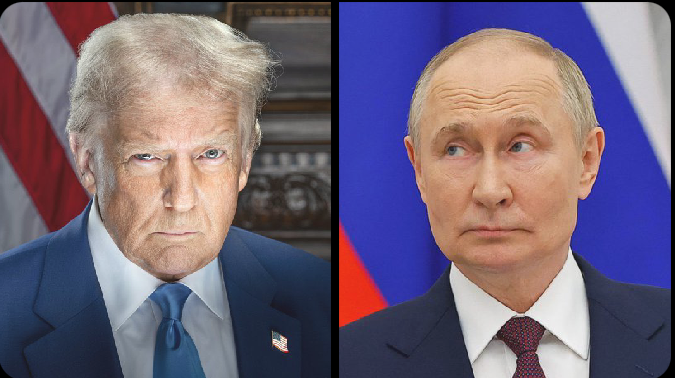
BREAKING: Trump Expresses Fury at Putin, Threatens Secondary Tariffs on Russian Oil

In a dramatic turn of events, U.S. President Donald Trump has voiced strong discontent with Russian President Vladimir Putin over the ongoing conflict in Ukraine.
Speaking to reporters, Trump did not mince words, declaring, \"I am very angry, pissed off at Putin.\" The President\'s frustration comes as diplomatic efforts to end the war in Ukraine have faltered, and tensions between the two global superpowers continue to escalate.
Trump made it clear that he is considering significant economic measures against Russia if a resolution to the war is not achieved soon. \"If Russia and I are unable to make a deal on stopping the bloodshed in Ukraine, and if I think it was Russia\'s fault, which it might not be, but if I think it was Russia\'s fault, I am going to put secondary tariffs on oil, on all oil coming out of Russia,\" he stated.
This latest development signals a potential shift in the U.S. administration\'s approach toward Russia, as previous diplomatic negotiations have yielded little progress. The proposed secondary tariffs could have severe economic repercussions for Russia, a country that relies heavily on oil exports for revenue.
Trump’s remarks indicate a growing impatience with the Kremlin\'s handling of the Ukraine conflict. The ongoing war, which began with Russia’s invasion in February 2022, has led to thousands of casualties, massive destruction, and an ever-deepening humanitarian crisis.
The President\'s proposed tariffs could further strain an already fragile global energy market. Russia is one of the world’s largest oil producers, and any restrictions on its exports could lead to price spikes, affecting economies worldwide.
The effectiveness of such tariffs would largely depend on international cooperation, particularly from major buyers of Russian oil, such as China and India. If the U.S. moves forward with these tariffs, it may attempt to leverage its alliances to persuade other nations to follow suit.
Trump\'s recent comments mark a stark contrast to his earlier, more conciliatory stance toward Putin. Throughout his political career, Trump has often spoken positively about the Russian leader, emphasizing his ability to negotiate with him directly.
However, this latest expression of frustration suggests that his patience is wearing thin. The President hinted that he plans to discuss the matter directly with Putin in the near future. \"I have a very good relationship with Putin, but he needs to do the right thing,\" Trump remarked.
This could signal a turning point in U.S.-Russia relations, which have been characterized by a mix of diplomacy and confrontation.
If implemented, the secondary tariffs on Russian oil could have far-reaching consequences. The global energy market is already dealing with the impact of existing sanctions on Russia, and further restrictions could drive oil prices even higher.
Analysts suggest that while such tariffs would put additional pressure on Russia, they could also backfire by increasing fuel costs in the U.S. and its allied nations. Consumers could see higher gasoline prices, which might lead to domestic political ramifications for the Trump administration.
Some economic experts warn that Russia could seek alternative buyers for its oil, potentially deepening its economic ties with China and India, thereby weakening the impact of U.S. sanctions.
Trump’s warning to Russia is likely to reverberate across diplomatic circles. European allies, many of whom have been directly affected by the Ukraine war, will be closely watching Washington’s next move.
The European Union has already imposed numerous sanctions on Russia, including restrictions on oil imports. However, many European countries still rely on Russian energy, making any additional U.S. tariffs a complex issue for global diplomacy.
A key question remains: Will other nations align with the U.S. in enforcing secondary sanctions, or will they continue to engage with Russia on energy trade? The answer to this will play a crucial role in determining the effectiveness of Trump’s proposed measures.
With no immediate resolution to the Ukraine conflict in sight, Trump\'s administration is likely to continue exploring economic and diplomatic measures to pressure Russia into a ceasefire or negotiations.
The Kremlin has yet to respond to Trump\'s latest remarks. However, Russian officials have previously dismissed Western sanctions as ineffective, arguing that they have only strengthened Russia’s economic resilience.
Observers speculate that Russia may retaliate against potential U.S. tariffs by restricting its own exports, which could further disrupt global energy supplies.
As the situation continues to develop, all eyes will be on the next steps taken by both Washington and Moscow. Will Trump follow through on his threat, and if so, how will Russia respond? These questions remain unanswered, but one thing is certain—tensions between the two nations are reaching a boiling point.
Trump’s declaration of anger towards Putin and his threat of secondary tariffs mark a significant moment in international relations. The conflict in Ukraine remains one of the most pressing geopolitical issues of our time, and the U.S.\'s approach to handling it could shape global stability for years to come.
As diplomatic efforts stall and economic pressure mounts, the world waits to see whether Trump’s strong rhetoric will translate into concrete action or if a new path to peace can be forged.


